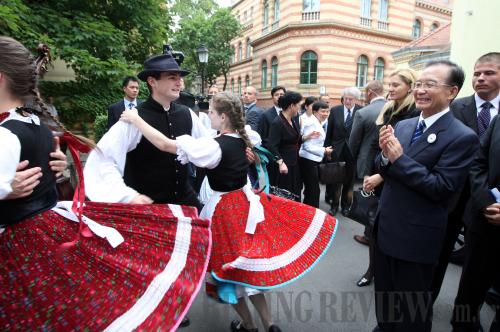|
 |
|
ENJOYING A SHOW: Chinese Premier Wen Jiabao watches a folk dance performed by students at the Eotvos Lorand University in Budapest, Hungary, on June 24 (YAO DAWEI) |
Cultural exchange
"Cultural exchange was another highlight of Premier Wen's European trip," said CIIS' Li.
On June 24, shortly after his arrival in Budapest, the Chinese premier attended a cultural exchange activity held at the Eotvos Lorand University. The university is the largest and oldest institution of higher learning in Hungary and serves as a key institute for Chinese language learning.
At the university, Wen watched a local folk dance as well as Chinese folk song and martial art performances by Hungarian students. He also presented Chinese books to the students.
Hungarian students expressed their willingness to expand exchanges with Chinese youth to promote understanding and friendship.
Wen's visit is the first visit to Hungary by a Chinese premier in 24 years. Hungary, from January to June holding the rotating EU presidency, is one of China's most important trade partners in Central and Eastern Europe. The two countries' trade reached a record high of $8.72 billion in 2010, up 28.1 percent compared to the previous year.
Later on June 26 in Britain, Wen visited William Shakespeare's birthplace in Stratford-upon-Avon.
"China is an ancient civilization, and Europe is a continent with a long history and profound cultures," Li said. "Cultural exchange between these two civilizations is of great significance."
Cultural exchange could expand the channels for the two sides to strengthen mutual understanding and lead to more consensuses, Li said.
Extensive consultation
During Wen's visit to Germany, the two countries launched an inter-governmental consultation mechanism, a dialogue mechanism aimed at enhancing cooperation between the two countries.
Along with the consultation, the two sides signed nearly 20 cooperative documents, with a contract value of more than $15 billion.
"This consultation is the highest in level, the largest in scale and the most wide-ranging in the history of Sino-German relations," said Ding Feiya, an associate research fellow with the CIIS' Department for EU Studies.
Ding said, though cooperation between China and Germany has blossomed, there are still many problems in Sino-German relations. For instance, Germany plays up the two countries' ideological differences from time to time. An important reason for this is the lack of political mutual trust, and the main purpose of this new mechanism is to strengthen that trust, Ding said.
Cooperation between China and Germany has expanded from economy and trade to finance, insurance and new energy. In 2010, China replaced the United States as Germany's biggest trade partner outside the EU.
In 2011, this momentum continues. From January to May, their bilateral trade reached about $66.3 billion, up 24 percent compared to the same period last year.
During the Sino-German inter-governmental consultation, the two sides set the goal of raising bilateral trade to $280 billion by 2015. They also decided to forge a strategic partnership on electric vehicle development and strengthen cooperation in new energy, energy conservation, environmental protection and energy efficiency.
Meanwhile, China decided to set up a 2-billion-euro ($2.8 billion) special loan to support cooperation between the two countries' small and medium-sized enterprises. | 